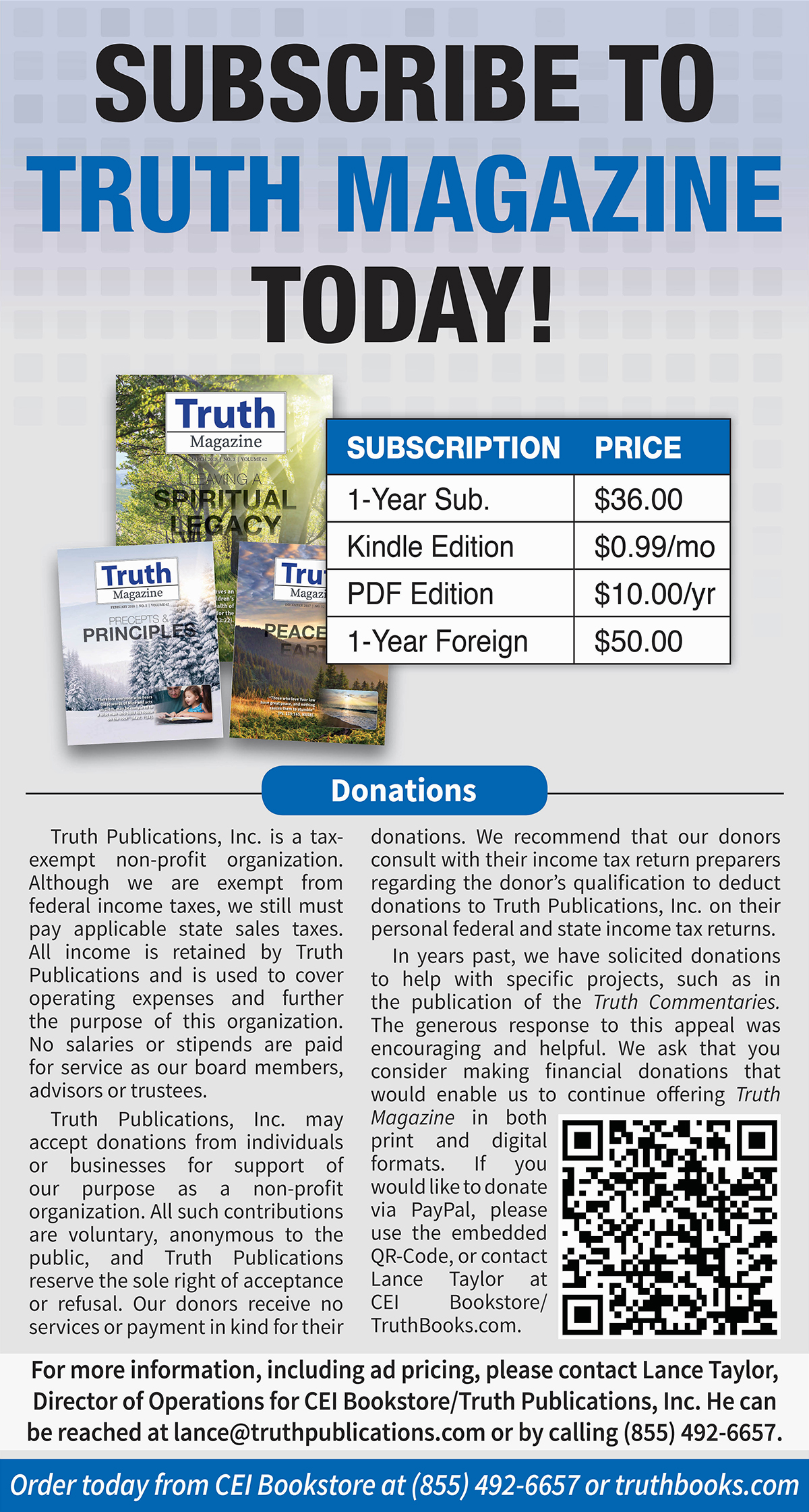

by Mark Mayberry
Synopsis: Since we are commanded to "understand," open-minded students of Sacred Scripture may intelligently grasp the will of God. Let us, therefore, strive to comprehend His commands and be conformed to His will.
Paul prayed that his brethren might be filled with knowledge, wisdom, and understanding (Col. 1:9-12). Realization of such a prayer is not beyond the realm of possibility. God created man in His own image, with intellect as well as the ability to reason and understand (Gen. 1:26-27).
When the Mosaic Covenant was instituted, it was read in the hearing of the people (Exod. 24:7). Reading from the law was to occur regularly and repeatedly so that Israel might hear, learn, and fear the Lord (Deut. 31:10-13). After possessing Canaan, the people assembled between Mount Ebal and Mount Gerizim. Joshua read all the words of the law (including the blessings and curses), according to all that was written; not a word was omitted; no one was excluded (Josh. 8:33-35).
In later times, especially during the days of the divided kingdom, when God's people drifted into apostasy, this mandate was neglected—the book of the law was lost, and memory of its precepts was forgotten (2 Kings 22:8-13). After the Assyrian and Babylonian exiles, which occurred because of such neglect, the practice of reading from the law was renewed (Neh. 8:1-8).
Note the particulars: (1) they were united: "all the people gathered as one man," (2) they were interested: "they asked Ezra the scribe to bring the book of the law of Moses," (3) they were attentive: "he read from it… from early morning until midday, in the presence of men and women, those who could understand; and all the people were attentive to the book of the law," (4) they were respectful: "Ezra opened the book in the sight of all the people for he was standing above all the people; and when he opened it, all the people stood up," (5) they were committed: "all the people answered, 'Amen, Amen!' while lifting up their hands; then they bowed low and worshiped the LORD with their faces to the ground," (6) they understood: Ezra's assistants "explained the law to the people while the people remained in their place. They read from the book, from the law of God, translating to give the sense so that they understood the reading" (NASB).
At the beginning of His public ministry, Jesus entered the synagogue (as was His custom) at Nazareth and read from the prophet Isaiah (Luke 4:16-21). Similarly, Paul exhorted Timothy to "give attention to the public reading of Scripture, to exhortation and teaching…" (1 Tim. 4:13-16, esp. v. 13).
Faith comes by hearing (or reading) divinely-inspired revelation (Rom. 10:14-21, esp. v. 17). Our eternal salvation depends upon how we respond to God's word (Luke 16:27-31). Accordingly, may we take heed how we hear and how we read (Jer. 23:18; Matt. 7:24-27; Rev. 1:3).
On one occasion, a lawyer tested Jesus, saying, "Teacher, what shall I do to inherit eternal life?" The Lord responded, "What is written in the law? How does it read to you?" He answered, "You shall love the Lord your God with all your heart, and with all your soul, and with all your strength, and with all your mind; and your neighbor as yourself." Reading from the law of Moses, this man compiled related texts and understood their combined meaning (Deut. 6:5; Lev. 19:18).
Jesus replied, "You have answered correctly; do this and you will live." The Greek word orthōs, translated "correctly," pertains "to acting in conformity with a norm or standard, rightly, correctly" (BDAG). This man clearly understood the teaching of Sacred Scripture. His failure involved personal application: attempting to evade his responsibility, he replied, "Who is my neighbor?" (Luke 10:25-29).
Paul exhorted Timothy, "Be diligent to present yourself approved to God as a workman who does not need to be ashamed, accurately handling the word of truth" (2 Tim. 2:15). The Greek word orthotomeō, translated "accurately handling," derived from the root mentioned above, means "to cut straight" (Thomas, 3718). BDAG says it means "guide the word of truth along a straight path (like a road that goes straight to its goal), without being turned aside by wordy debates or impious talk" (722).
In writing to the Ephesians, the inspired apostle affirms two related points: understanding is possible: "When you read, you can understand" (Eph. 3:1-5, esp. v. 4), and understanding is commanded: "Do not be foolish, but understand what the will of the Lord is" (Eph. 5:17).
What does it mean to understand? The Greek word noeō means "to perceive, think" (Thomas, 3539). BDAG says it means "(1) to grasp or comprehend something on the basis of careful thought, perceive, apprehend, understand, gain an insight into; (2) to think over with care, consider, take note of; (3) to form an idea about something, think, imagine; (4) to pay heed with intent to act appropriately, be minded."
The phrase, "have you not read," and similar variations, frequently occurs in the gospels. Considering these passages grouped by topic, it is evident that reading the Old Testament should have resulted in a correct understanding of God's will. A failure or refusal to understand God's will reflects a spirit of rebellion (Matt. 13:10-17). Jesus' critics stood condemned for not drawing the correct conclusion and making the appropriate application.
Responding to the charge that His disciples had violated the Sabbath, Jesus asked, "Have you not read" of David eating the shewbread and the exemption allowed for priestly service (Matt. 12:1-7, esp. vv. 3 & 5; Mark 2:23-28, esp. vv. 25)? They ignored David's various transgressions in his flight from King Saul, which included deception in addition to eating the showbread (1 Sam. 21:1-7), but condemned Jesus for violating God's law, when neither He nor His disciples were guilty of "working" on the Sabbath. Furthermore, the performance of priestly service on the Sabbath was not only allowed but commanded—a "technical violation" exempt from the general prohibition against labor. Finally, their criticisms were unjustified because Jesus is Lord of the Sabbath.
On other occasions, when Jesus was condemned for healing on the Sabbath, He reminded his critics that they understood that rules might be impacted by emergency conditions or extenuating circumstances (Matt. 12:11-12; Luke 13:15; 14:5-6). If, on occasion, two rules seemingly contradict, deference is given to the greater (John 7:21-24).
Responding to the Pharisees' question regarding divorce, Jesus asked, "Have you not read" God's original intent for marriage (Matt. 19:3-12, esp. v. 4)? Instituting the marital relationship, God said, "For this reason, a man shall leave his father and his mother, and be joined to his wife, and they shall become one flesh." This language implies that marriage involves a life-long commitment (Gen. 2:18-24, esp. v. 24). Furthermore, the Pharisees treated the Mosaic instructions on divorce as a divine commandment rather than an allowance based upon the hardness of man's heart (Deut. 24:1-4).
Responding to the Sadducees' denial of the resurrection, Jesus asked, "Have you not read" God's statement to Moses at the burning bush (Matt. 22:23-33, esp. v. 31; Mark 12:18-27, esp. v. 26)? The precise language of the Exodus account implies that man's soul survives beyond death: "I am (as opposed to "I was") the God of your father, the God of Abraham, the God of Isaac, and the God of Jacob" (Exod. 3:1-6).
When children rejoiced over Jesus' miracles of healing, the chief priest and scribes were indignantly critical. Jesus replied, "Yes; have you never read, 'Out of the mouth of infants and nursing babies You have prepared praise for Yourself'?" (Matt. 21:14-17). While the writer of Hebrews treats Psalm 8 as a Messianic psalm, this particular verse is not overtly so (Ps. 8, esp. v. 2; Heb. 2:5-8). Nevertheless, Jesus' critics should have recognized that God is well-pleased with the praise of innocent children (Matt. 11:25-26).
As opposition continued to mount, Jesus proclaimed the parable of the vine-growers, foreshadowing His death at the hand of the religious establishment (Matt. 21:33-41; Mark 12:1-9; Luke 20:9-16). He concluded by saying, "Did you never read in the Scriptures, 'The stone which the builders rejected, this became the chief corner stone; this came about from the Lord, and it is marvelous in our eyes'" (Matt. 21:42-46; Mark 12:10-12; Luke 20:17-18)? Although the statement is obscure, an application was made to David in the Targum, and "there could be a trace of a very old interpretation in terms of the Messiah" (Allen, 165).
The prophets warned of the perils that arise when God's people lack knowledge and understanding (Isa. 1:3; 5:13; Hos. 4:6). Sometimes the fault lies with leaders (Mal. 2:7-9), sometimes with followers (Jer. 6:16-17).
On other occasions, the opposite problem arises: We may be puffed up with pride, arrogantly trusting in our superior understanding, dismissive of our brethren (1 Cor. 4:6-7; 8:1-3). Egotism may foreshadow friction, factionalism, and false teaching (1 Tim. 6:3-5).
Consider Paul's warning against those who preach a different gospel (Gal. 1:6-9, esp. v. 7). In this context, the Greek word metastrephō, here translated "distort," means "to cause a change in state or condition, change, alter something into something, often it's opposite" (BDAG). Other instances, such as "the sun will be turned into darkness" (Acts 2:20) or the variant reading of James 4:9, "let your laughter be turned into mourning and your joy to gloom," emphasize the significance of the change.
Ponder Peter's warning untaught and unstable individuals who distort the rest of the Scriptures (2 Pet. 3:14-18, esp. v. 16). In this context, the Greek word strebloō, translated "distort" means "to distort a statement so that a false meaning results, twist, distort" (BDAG).
Hearing is not enough; obedience is essential (Matt. 7:24-27). Jesus said, "If you know these things, you are blessed if you do them" (John 13:17). Hypocrisy is a barrier to evangelism (Rom. 2:17-24).
While sinful men close their minds to God's will, so that "there is none who understands" (Rom. 3:9-12, esp. v. 11), Jesus helps His faithful disciples to comprehend the Scriptures (Luke 24:44-49, esp. v. 45). He promised, "If anyone is willing to do His will, he will know of the teaching, whether it is of God or whether I speak from Myself" (John 7:16-18). Therefore, let us be devoted to understanding the Scriptures.
Allen, Leslie C. Word Biblical Commentary: Psalms 101-150 Revised, Vol. 21. Nashville: Thomas Nelson Publishers, 2002.
BDAG = Bauer, Walter, Frederick W. Danker, William Arndt, and F. Wilbur Gingrich. A Greek-English Lexicon of the New Testament and Other Early Christian Literature. 3rd ed. Chicago, IL: University of Chicago Press, 2000.
Thomas, Robert L. New American Standard Hebrew-Aramaic and Greek Dictionaries: Updated Edition. Anaheim, CA: Foundation Publications, Inc., 1998.
Author Bio: Mark and Sherelyn have labored with the Adoue Street church of Christ in Alvin, TX since 1998, where he serves as the evangelist and an elder. The church website is ascoc.org. His Bible study website is markmayberry.net. He can be reached at mark@truthpublications.com.

